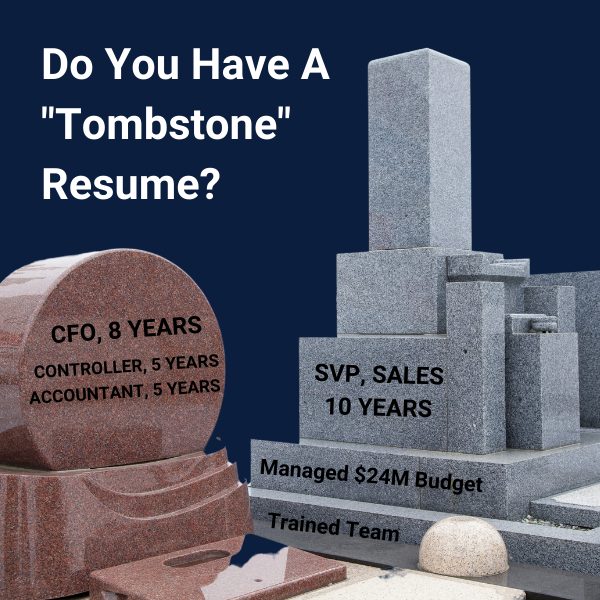
31 Jul
Do You Have A “Tombstone” Resume?
While most people think of resumes as employment histories, today’s resumes are marketing tools designed to sell you (the product) to a potential employer (the buyer).
They are not boring lists of responsibilities. They are not a place to document everything you do on a day-to-day basis. They don’t include every job you’ve ever had or every single thing you’ve done during your career.
That style of resume is sometimes called a “Tombstone” resume because it focuses on the past, not the future.
To be effective, your resume needs to highlight the skills and achievements that make you valuable to potential employers.
What Future-Focused Means
The days of getting a job based on your experience or job title alone as long gone. You may think managing a $MM budget or having executives reporting to you is impressive. But, on it’s own, it’s not.
People in similar positions do similar things. For example, the VP, Marketing for Nike does pretty much the same thing as the VP, Marketing for Adidas. They create marketing campaigns, conduct market resarch, analyze data, manager a team, etc.
What sets one apart from the other is the impact he or she has made on their employer. That’s why career professionals say to focus achievements, impact, or results.
Crafting Your Marketing Document
When it comes to writing your resume, don’t rely on X number of years in your position or your job title. Think about the impact you made.
Put simply, why were things better because you were there?
Focus on the future rather than the past. This means highlighting the skills and abilities you want to use in your target position. Going back to the previous example, if you have a variety of marketing experience but your goal is to work in digital marketing, feature achievements that showcase your digital marketing expertise.
Generally, there’s no need to go back in detail more than 10 to 15 years. Based on the study done by The Ladders, recruiters and employers are most interested in your current or most recent position and possibly the one before that. Think of your resume like a funnel with the space dedicated to each position declining as the years increase.
Think strategically about your resume content. While job seekers often want to include “everything” they can do, an unfocused resume will not serve you well.
It’s important to frame your resume content in a way that best sells you to potential employers. That said, you should never lie, misrepresent, or grossly exaggerate. Here’s why lies matter.
Extra Essential Information
If, like most of my clients, you’ve had a lengthy career, there may be older important details. Older employment can be listed under a Prior or Earlier Career Section that includes titles and company information. But, no dates.
Earlier speaking events, publications, patents, etc. can be included in an addendum that can be sent as needed. Likewise, with extensive education that includes fellowships or study abroad programs.
Once you are finished writing your resume read it with “so what?” in mind. You may have established key-performance indicators, but what difference did it make? How did it help your department and/or company? Like all of us, employers are listening to Station WIIFM. Make sure you show them.
